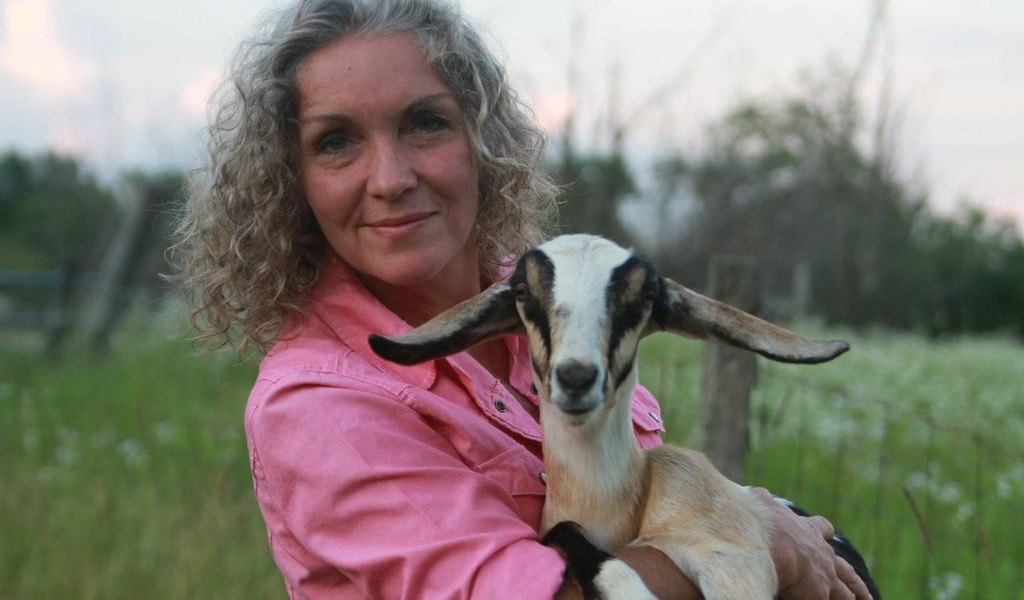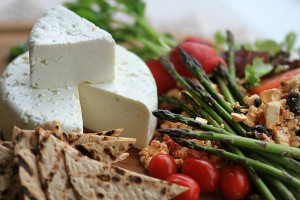Abbe Turner started Lucky Penny Farm with her husband, Anderson, with the intention of providing their three children with an environment that fosters creative growth. Ten years later, her idea has had impact far beyond the Turner Family. Today, Lucky Penny Farm serves as a model for community building and local entrepreneurialism. “Lucky Penny is all about influential-ism,” Abbe explained. “Small things add up, small pennies add up. Every little action counts and every step forward is a good step.”
Abbe entered farming with little experience in the field, coming from a background as a professional fundraiser primarily for non-profit organizations. Though she carries some of her past work into her farm practice, Abbe embraced her love of animals and getting dirty when she bought a 14-acre century-farm in Garrettsville, Ohio, now dubbed Lucky Penny Farm.
When she started out, there were limited funding opportunities available for beginning farmers—certainly less than today. Abbe says she would not have been able to begin Lucky Penny without learning of the Slow Food movement, which promotes sustainable foods and local small businesses instead of the industrial globalization of our food system. The Slow philosophy inspired Abbe to raise enough funds to start-up the farm through grassroots organizing and support from her local community. Through Slow Food, she also learned and implemented into her own business the movement’s three basic principles: good, clean and fair.
Though she started farming by growing cut flowers, Abbe quickly realized that her passion and skills would be best put to use raising goats, currently including Nubian, La Mancha and Alpine dairy goats. Abbe finds goats to be intelligent animals filled with personality and gentleness. She said goat milk is “the best—bar none,” in that it is chock-full of protein and other essential nutrients.
Before leaving her full-time job to embark on farming full-time, Abbe attended as many classes as possible. Abbe learned how to make artisan goat-based products, particularly cheese. She dedicated all of her vacation time, weekends and nights to learning more about the craft, whether this meant making a new professional contact or learning a new skill. In the early stages of her educational pursuit, Abbe received a small grant from Farm Aid that allowed her to attend a cheese-making class in 2007 with the Pennsylvania Association for Sustainable Agriculture. “I am grateful to Farm Aid for making an investment in me in my early stage,” Abbe said. “I hope to be able to pay it forward and make investments in people, other small entrepreneurs.”
Paying it forward is exactly what Abbe has been doing through partnerships with other local farms and businesses. Her business expanded when the Turners invested in a value-added processing facility, and thus, in 2010 the Lucky Penny Creamery was born. The creamery produces artisan cheese using goat milk from seven different local farms to fill orders, predominantly for local chefs. Each farm is held to a basic integrity standard, with Abbe’s most important criteria being that all of the animals have the opportunity to graze outside daily. Abbe’s standards for her own herd require that all of the livestock at Lucky Penny is raised free of antibiotics, pesticides, preservatives and growth hormones. That being said, Abbe recognizes that every farmer has a different definition of what integrity in agriculture means, and as a result each of the seven farms supplying her goat milk engage in different practices that are most sustainably catered to their own farm.
In addition to raising goats, Abbe also has a small produce garden, chickens and Mulefoot hogs. The Mulefoot hogs are an important key to the sustainability of Lucky Penny. The process of producing goat cheese creates a large quantity of excess whey, but it turns out this “waste product” can be put to use as nutritious animal feed! Abbe uses the whey as 30 percent of the hogs’ diet. It’s an environmentally sensible use of the remnants left from cheesemaking. Moreover, Abbe has partnered with a local brewery and restaurant to feed the hogs excess, protein-rich beer grains leftover from the brewing process and food scraps from the restaurant. Beer, cheese and restaurant leftovers—sounds like a pretty good life, huh?
With only 200 breeding pairs of this specific type of swine in the country, Abbe specifically chose Mulefoot hogs in an effort to protect indigenous food methods. “We have the ability, on a small scale,” Abbe explained, “to raise things that might not have the highest yield, but that protect the genetic diversity of our food offerings in this country, and that’s important.” As the most rare breed of hog in America, the Mulefoot is part of the Slow Food Ark of Taste, a collection of endangered foods.
Abbe is an advocate for female entrepreneurialism, particularly in agriculture. Between 2002 to 2007, according to the U.S. Department of Agriculture census, the percentage of farm operators who are women jumped from 27 to 30 percent. Abbe employs a young woman as an agricultural worker and plans to loan space from her value-added processing facility to two young female entrepreneurs. Abbe explained Lucky Penny is dedicated to helping women who want to enter the agricultural field. “I think that the changes in our demographic and social patterns are going to bring more women to farming as more families become concerned with the way we feed our children.”
From fundraising to farming, with a creamery and now a new candy operation using goat milk, life for Abbe has certainly transformed in the past ten years. She intends to continue to use her new lifestyle to be a change agent to close the gap between urban and rural relationships. “As more people pay more attention to the way we eat,” Abbe said, “more light will shine on the way that we produce food and the importance of farming in a holistic and sustainable way that protects the soil and water.”
Further Reading
- Learn more about Farm Aid’s grant program, which funds family farm and rural service organizations all over the country. We rely on these critical on-the-ground partners in the movement to keep family farmers on the land, producing good food for all.
- For resources to find food from family farmers like Lucky Penny Farm in your area, check out our Find Good Food page.
- Visit Lucky Penny Farm’s site for lots more information on the farm and the food they produce.




